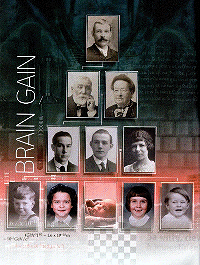 |
Kids... they spend all their time playing video games and texting each other. Where's it ever going to get them?
Phyllida Brown
A CLICHE it may be, but you have to admit it's true. Most kids
are much better than their parents at programming the video or setting up
the new computer. Almost certainly they can thrash Mum and Dad at video games.
And they probably think they are smarter than their parents. But here's the
surprise: those kids may be right. If IQ tests
tell us anything at all, today's young people really are smarter than their
parents. Studies from numerous countries suggest that IQ scores have been
rising fast since at least the 1950s-enough to mean that someone with an
IQ classed as average then could be labelled as having low intelligence today.
Humans, it seems, are getting cleverer and cleverer with each passing generation.
But not so fast. Intelligence is a slippery concept
at the best of times. There's a serious argument among psychologists
over just what the upward trend in IQ scores really means. Some researchers
argue that we're not getting more intelligent overall, just getting better
at a particular sort of problem-solving. Others, though, say they have found
echoes of rising IQ scores in "real world" measures
of intelligence. And to confuse things still more, there are hints that
the trend may be about to grind to a halt.
Dumb and dumber
WHATEVER it is that IQ tests measure, we've been getting
progressively better at doing them for several decades. Political scientist
James Flynn identified the trend in the 1980s, and since then the evidence
for rising IQs has grown as relentlessly as the test scores themselves. Alas,
nothing lasts forever. This week we report the first evidence that the era
of booming IQ growth is over (see p 24). Indeed, a pessimist scanning the
latest figures from Denmark, a country noted for its detailed IQ records,
might conclude that average IQs have not just peaked but are heading back
down (see Diagram). Should we be alarmed?
It will be several more years before we can be certain of the
new trend, but even if the dip is sustained for decades to come it won't
spell catastrophe for intellectual life. Far from it. Take the IQ rise of
recent decades at face value, and the average child today should be as bright
as the near genius of yesteryear. So where is the unparalleled renaissance
this should have brought about? The fact that there hasn't been one powerfully
exposes the limitations of IQ as a proxy for intelligence. |
What should we make of all this? The obvious person to ask
is James Flynn, professor of political science at the University of Otago
in Dunedin, New Zealand. He first showed that IQ scores were rising in the
mid-1980s and became famous after others dubbed what he observed the "Flynn
effect". The findings raised a whole new set of questions about what IQ tests
can and cannot tell us.
In a landmark paper published in 1987, Flynn made detailed comparisons across
14 countries of trends in the results of tests that measure people's reasoning
power. The most complete data came from countries where military service
had continued into the 1980s, such as the Netherlands and Belgium. Virtually
every young man (and in some countries, every young woman) had to sit a test
set by a draft board, so the results were representative of the population.
The tests vary from country to country but their results can be converted
into IQ scores for comparison. For other countries, Flynn had to rely on
IQ test data. Overall, the results he published in Psychological
Bulletin (vol 101, p 171) showed a real growth in scores of up to 25
points in a generation.
Still, though, the crude overall scores didn't tell Flynn enough.
To find out more, he looked at scores for each type of reasoning IQ tests
set out to measure, such as verbal, numerical and visuo-spatial. This last
group usually includes Raven's matrices-sequential patterns with a piece
missing (see below). The candidate has to choose from
a set of alternatives which shape to put in the empty space. When Flynn took
a closer look at the scores, the pattern was clear. The strongest gains in
almost every case were on Raven's matrices and similar tests, while verbal
and arithmetical scores showed more modest rises. Since the 1987 paper, Flynn
has looked at more countries, including Israel and, most recently, Argentina.
He finds the same upward trend, with abstract and visuo-spatial skills
responsible for most of the climb.
Flynn is sure his eponymous effect is meaningful, but does
not believe we're all turning into brain-boxes. "Our grandparents were not
retarded, and we are not geniuses," he says. More likely we have simply developed
the skills and habits of mind that make us better at solving abstract
problems-and, just as important, to take such problems seriously.
"People really have got better at some sorts of problem solving," says Flynn.
The reason, he argues, is that, over time, our society has been pulling the
triggers that make people develop these skills. When our grandparents were
growing up, people valued different mental skills, such as
doing mental arithmetic or building up a
good vocabulary. Their reaction to some of the
problems that we now take so seriously would have been: "What's the point?".
Flynn believes that in societies where intelligence testing has become something of an obsession, abstract problem-solving skills develop faster than other skills. Likewise, demands on people's visuospatial abilities have grown because of TV, computers and car driving, so successive generations would be expected to develop their skills in this direction more than in others. "I don't think intelligence advances all at once," he says. Most psychologists accept that IQ scores have risen. But there are different views about what might account for the increase (New Scientist, 21 April 2001, p 44).
'WHEN IT COMES TO PROBLEM SOLVING AND VISUO-SPATIAL SKILLS, YOU ARE SMARTER
THAN YOUR PARENTS AND SMARTER STILL THAN YOUR GRANDPARENTS'
Some, such as experimental psychologist Robert Howard at the University of
New South Wales in Sydney argue that our overall intelligence really has
risen, helped by better nutrition, smaller families, wider access to education
and other environmental changes. And John Rust at Goldsmiths College, University
of London, suggests that it's not just an increased emphasis on visuo-spatial
activities that is pushing up IQ scores. Among several factors, he thinks
that as society becomes more complex, people are having to think harder about
all sorts of problems. Also, he points out, if one advanced individual first
understands a concept, such as
Einstein grasping the theory of relativity, it
may be easier for all of us to think in a more sophisticated way: collectively,
we may be getting used to dealing with more complex ideas.
But some researchers are looking beyond people's performance
in IQ tests and have begun searching for "real-world" evidence that humans
are getting more intelligent. In a study last year, Howard analysed a basket
of indicators including scientific productivity and performance in intellectual
games such as chess, bridge and go. From
this he tentatively concluded that people really could be getting progressively
cleverer. For example, the age of the youngest chess grandmaster has fallen
four times since 1991 having stayed the same since the 1950s. Admittedly,
none of the measures taken alone is compelling evidence of a rise in
intelligence. An increase in scientific productivity, for example, could
simply reflect the fact that scientists are under ever-increasing pressure
to publish papers. And some measures, such as the number of patents awarded,
did not show clear trends (Personality and Individual Differences,
vol 30, p 1039).
 |
| Shape up:scores in tests such as the ones shown above,which are designed to assess visuo-spatial reasoning,have risen consistently since the 1960s. Some researchers argue this is evidence that humans are becoming more intelligent. Others say it's simply a product of our environment becoming more visually challenging. |
But despite these reservations, Howard reckons there really
is something going on, especially with visuo-spatial skills, such as those
that good chess players need. "Kids are getting much more visually smart,
because they deal with visual things all the time," he says. And, like Flynn,
he believes this is pushing up their IQ scores.
Whatever the underlying cause, it looks as if the Flynn effect is real. When
it comes to problem solving and visuo-spatial skills, you are probably smarter
than your parents, and smarter still than your grandparents. But can it carry
on? Would someone with average intelligence today be thought of as a dunce
in 2050? Perhaps not.
Howard's latest research has sent him on a different line of
enquiry. Controversially, he now believes that the rise in intelligence might
have peaked in the industrialised countries. His conclusions come, in part,
from surveys of schoolteachers. "If intelligence is rising, teachers should
be reporting it," he says. No one had asked them systematically, so Howard
surveyed high-school teachers in Sydney who had been working since at least
1979. Most of those who replied said that children's general intelligence
was not rising.
Next, Howard gave the same questionnaire to experienced teachers in Australian
primary schools, and primary schools in Singapore and South Korea. The difference
was striking. Primary-school teachers in Australia said that children had
not got any brighter over the years. But the primary teachers in Singapore
and South Korea overwhelmingly said that children there were getting cleverer.
"It's absolutely taken for granted that kids today are smarter than they
were," Howard says. He believes the contrast with Australian teachers' viewpoints
is not an artefact. "My interpretation is that the rise in general intelligence
in industrialised countries stopped quite a long time ago."
He speculates that in industrialised societies the social changes
that stimulated a rise in overall intelligence have now slowed down, with
only visuo-spatial skills continuing to improve. In contrast, the Asian tiger
economies have developed into modern societies in about 40 years and rapid
change continues.
To support his view, Howard cites data from Denmark. The Danish military
still summons virtually all young men before a draft board, even though few
now have to do military service against their will. Since 1957, all 17-year-olds
have sat exactly the same intelligence test - including tests similar to
Raven's matrices. Candidates must also be able to identify the
basic geometric
shapes that make up a more complex
shape. There are also verbal questions, such as
"Sun is to day as Moon
is to?", and number series questions, such as 2
3 5 8 ?.
Results in these tests have been carefully analysed by Thomas
Teasdale, a neuropsychologist at the University of Copenhagen, and David
Owen, now at The City University of New York. During the 1960s and 1970s,
scores showed gains on a scale similar to those of
other countries. But by
the 1990s, the rate of improvement slowed right down to about 1 IQ point
over the decade (Intelligence, vol 28 p 115) What's more, the scores
were improving only on the visuo-spatial questions. Verbal and numerical
performance was flattening out.
That wasn't all. Scores from 1999 onwards show an overall downturn, Teasdale
has recently reported. He adds that 1999 was also the first year on record
in which the number of Danish teenagers being admitted to post-16 academic
education fell. Why was this happening? One reason might be that there is
some limit to people's potential in the tests, and that Danish teenagers
are now reaching it. There might be some absolute ceiling to people's abilities
to perform these tasks, no matter how much the prevailing culture encourages
them. But according to Teasdale, that can't be the answer "It wouldn't explain
why scores are starting to go down," he says. If a ceiling had been reached,
the test results should show scores pushing against it, not falling.
The great leveller
Howard thinks that the levelling off of IQ scores in Denmark could be down
to a problem with motivation. From his surveys of Australian schoolteachers,
he received a strong signal: most thought their students were no brighter
or dumber than before, but the vast majority complained that students were
less interested in school work. Teasdale isn't convinced by this either:
The teachers' views could just be an example of adults' tendency to think
the worst of youngsters, he suggests. The trouble is, even in South Korea,
where teachers thought their kids were getting brighter, secondary-school
teachers reported that students' motivation seemed to be lower than in the
past.
 |
Yet the biggest and most awkward missing piece in this jigsaw
is schooleavers' academic results. Worldwide, are results improving, getting
worse, or staying more or less the same? Unfortunately, it's hard to tell.
Tests have changed over the years, and because the numbers of students taking
them also change it is difficult to get a sense of how well candidates are
doing. The best guess is that overall performance is staying flat, if not
actually falling. In the US, where a school-leavers' test has stayed relatively
unchanged, the results since the 1950s show at best a plateau. In Britain,
the number of students achieving high exam grades at age 18 has increased
sharply since 1990. But Rust thinks that this represents a lowering of
examination standards to allow more people to enter higher education. "If
you change access from 5 to 30 per cent, the only way to do so is to lower
entry standards."
Flynn himself is keeping a close eye on the findings. He's
not jumping to conclusions until data from more countries come in, but he
does wonder whether we've reached a point where students are not willing
to be pushed any harder. Could the conditions that have led to such a dramatic
improvement in ability disappear as societies grow more and more affluent?
"In human history, affluence often leads to decadence," he says. "Look at
what happened to the Romans: they got lazy and hired Greeks to do their thinking
for them." So far there is no reason to think that industrialised societies
are heading that way. But maybe, just maybe, we should be worried.
